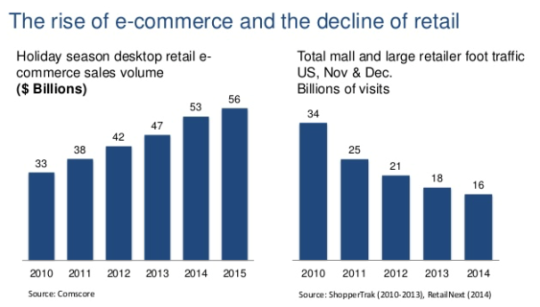By Andi
Simon, Simon Associates

You don’t have to look far to see the massive changes that
brick-and-mortar retailers face today. The challenges are everywhere. Generations
that used to buy goods from actual stores are being replaced by waves of people,
particularly Millennials, who have mastered the art of online shopping. E-Commerce
providers have enormous power. And manufacturers are going directly to end
users, cutting out the retailer altogether. Creating even more pain is the pressure
to hold onto talented employees to serve those few customers who are still
visiting stores.
The pain of
change for retailers is real, and only getting worse.
Why haven’t retailers seen the changes coming all around them and
adapted to them, not fled from them? They remain stuck, reluctant to abandon
what they’ve always known, resistant to change and scared of what the future
brings.
5 BIG Reasons
Why Change Is So Scary
1. The power
of the herd. As humans have evolved, we have stuck close to others like
ourselves, whether you call it a tribe or a community or a “herd.”
2. The data
is talking to you. Can you hear it? Take a look at this 2014 trend analysis
of e-Commerce purchases and mall foot traffic. Clearly, the decline of brick
and mortars has been coming for a while. What were retailers watching? The data
was speaking to them but they chose not to listen.

3. Habits
are comfortable. Our brains are habit-driven. As Charles Duhigg wrote in “The
Power of Habit,” we have brains that are most comfortable when our
habits take over. Yes, the brain is plastic and we can learn new things, it
just takes effort — and a little pain.
4. Your
brain hates to change. Your brain uses 25% of your body’s energy. By the
time you are 30, you’ve created your personal mind map of reality that is your
“truth.” You sort what you see and hear and experience, based on how these fit
your mind map. Change literally creates chemical reactions in the brain that
say “stop that.”
5. It’s not
a crisis — yet! We often tell
clients that they have a hard time changing unless there is a crisis or they
create one. David Rock and Jeffrey Schwartz describe this in detail in Neurosciences
and Leadership.
What Do You Do? Flee?
Fight? Or Embrace The Changes?
Change is not going away and the future is upon us. That
said, here are some effective change strategies that retailers might be ready
to try, now that the crisis is upon them.
1. The end
of competitive advantage. Forget the competition. What are you going to do
to open a new market space by adding value innovatively? That does not mean
another sale. It means you must step out and look at the consumer with fresh
eyes. What does he/she really need? Think Starbucks, Amazon, even
Uber.
2. Speed and
ease. Let’s face it, today’s fast-paced lifestyle has taken over. What can
the retailer do to make “speed and ease” their strategy?
3. Become a
platform, not a retailer. We met with prospective clients recently who once
worked at jewelry stores that have closed. Now, they are creating a concierge
service to connect consumers who want to buy jewelry with the purveyors of
beautiful diamonds and rubies. No inventory. No retail space. Just a service
like Uber connecting those with a need with those with a solution.
4. Nonusers
await you. Who is not using you but could? Why are they avoiding you? Did
they try you once and never came back? That is a market awaiting you, so refocus
beyond your current customer.
5. Unmet
needs. Even your current customers have unmet needs. Spend a day in their
life as an anthropologist might, and watch and listen. Focus not on what they
are doing with you or other retailers but on what they could do with you and what you
could do for them—albeit differently.
Time To Re-Imagine Retail
The times they are a-changin’, as Bob Dylan sang to us many
years ago. Perhaps it is time to embrace the changes and stop fighting them. Look
around — opportunities await you!
Andi Simon, author of On the Brink: A Fresh Lens to
Take Your Business to New Heights, is a corporate anthropologist and
award-winning author. She is the founder and CEO of Simon Associates Management Consultants, designed over a decade ago
to help companies use the tools of anthropology to better adapt to changing
times. Simon, who works with clients globally, also is a public speaker who has
addressed audiences throughout the world and is an Innovation Games facilitator
and trainer. She has shared her expertise and insights at hundreds of
workshops. Simon served as a tenured professor of anthropology and American
studies at Ramapo College of New Jersey, and was a visiting professor teaching
entrepreneurship at Washington University in St. Louis. Simon has appeared on
“Good Morning America” and has been featured in the Washington Post and
Business Week, and on Bloomberg Radio. She is a Huffington Post contributor and
a blogger for Forbes.






